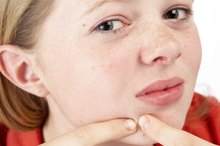What does fact checked mean?
At Healthfully, we strive to deliver objective content that is accurate and up-to-date. Our team periodically reviews articles in order to ensure content quality. The sources cited below consist of evidence from peer-reviewed journals, prominent medical organizations, academic associations, and government data.
The information contained on this site is for informational purposes only, and should not be used as a substitute for the advice of a professional health care provider. Please check with the appropriate physician regarding health questions and concerns. Although we strive to deliver accurate and up-to-date information, no guarantee to that effect is made.
Deficiency in Amino Acid in Rosacea Sufferers
People with rosacea experience skin inflammation that most commonly affects their face. Characteristic features include red patches and pus-filled bumps. A lack of traditional medical treatments has led to an increased interest in alternative approaches. Proponents assert that if you have rosacea, you may be deficient in lysine, an amino acid that aids in collagen production. However, clinical data to support this claim are lacking. Consult your physician before using lysine to treat rosacea.
Background
Rosacea is a chronic skin condition with poorly understood mechanisms. It typically starts after age 20 and is more common if you're fair-skinned. The cause remains unknown, and this contributes to the failure of the scientific community to discover a cure. Rosacea typically worsens over time when left untreated. Doctors generally recommend that you reduce common triggers, which include stress, alcoholic beverages and sun exposure.
- Rosacea is a chronic skin condition with poorly understood mechanisms.
- The cause remains unknown, and this contributes to the failure of the scientific community to discover a cure.
Amino Acids
What Causes Keratin Buildup?
Learn More
Amino acids are most commonly known for being the blocks that help your body build, repair and maintain itself. As of the time of publication, the mainstream medical community holds no association between amino acid deficiencies and rosacea development. However, proponents such as orthomolecular therapist Billie J. Sahley theorize that a deficiency in certain amino acids can contribute to skin problems.
Lysine
Of the about 22 common amino acids, your body can produce about half, and the remainder must come from your diet. Lysine is an amino acid of dietary necessity. It plays an important role in collagen production, which is a substance your skin and other connective tissues are made of. Lysine's role in skin health appears to contribute to skin problems if a deficiency exists, Sahley explains in her book "Acne and Other Skin Problems Health Educator Report. 2"
- Of the about 22 common amino acids, your body can produce about half, and the remainder must come from your diet.
Considerations
Vitamin and Mineral Supplements for Rosacea
Learn More
Clinical data examining the effect of lysine on rosacea are lacking, as are studies showing that people with rosacea have an amino acid deficiency. Instead, research suggests an immune-related contribution. Scientists found that people with rosacea have abnormally high levels of cathelicidin, an anti-microbial peptide that promotes skin inflammation in order to protect the skin from infection 3. In animal studies, this exaggerated immune response causes characteristics of rosacea, according to a study published in the August 2007 issue of the journal "Nature Medicine." Antibiotics that inhibit cathelicidin tend to help relieve rosacea.
- Clinical data examining the effect of lysine on rosacea are lacking, as are studies showing that people with rosacea have an amino acid deficiency.
Related Articles
References
- University of Maryland Medical Center: Lysine
- Acne and Other Skin Problems Health Educator Report #55; Billie J. Sahley, Ph.D.
- Nature Medicine: Increased Serine Protease Activity and Cathelicidin Promotes Skin Inflammation in Rosacea
- National Rosacea Society. Causes of rosacea: Introduction.
- Ahn CS, Huang WW. Rosacea pathogenesis. Dermatol Clin. 2018;36(2):81-86.doi:10.1016/j.det.2017.11.001
- Wollina U. Is rosacea a systemic disease?. Clin Dermatol. 2019;37(6):629-635.doi:10.1016/j.clindermatol.2019.07.032
- Haber R, El gemayel M. Comorbidities in rosacea: A systematic review and update. J Am Acad Dermatol. 2018;78(4):786-792.e8.doi:10.1016/j.jaad.2017.09.016
- Aponte JL, Chiano MN, Yerges-armstrong LM, et al. Assessment of rosacea symptom severity by genome-wide association study and expression analysis highlights immuno-inflammatory and skin pigmentation genes. Hum Mol Genet. 2018;27(15):2762-2772.doi:10.1093/hmg/ddy184
- Alinia H, Tuchayi SM, Patel NU, et al. Rosacea triggers: Alcohol and smoking. Dermatol Clin. 2018;36(2):123-126.doi:10.1016/j.det.2017.11.007
Writer Bio
Janet Renee is a clinical dietitian with a special interest in weight management, sports dietetics, medical nutrition therapy and diet trends. She earned her Master of Science in nutrition from the University of Chicago and has contributed to health and wellness magazines, including Prevention, Self, Shape and Cooking Light.









